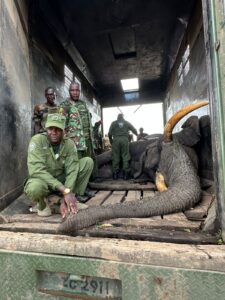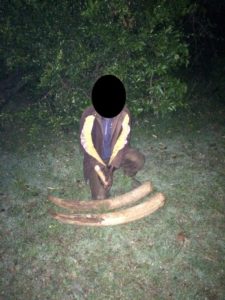
The last three months have been busy for the entire Mara Elephant Project team. To begin with ranger activities, the MEP intelligence team continues to truly be one of MEP’s brightest jewels. Their intelligence was responsible for eight notable ivory arrests by the Kenya Wildlife Service (KWS) and Tanzania National Parks Authority (TANAPA) in the second quarter of 2019 and the seizure of 120.6 kg of ivory (21 kg in April, 40 kg in May and 59.60 kg in June). This continued threat to elephants shows that we need to continue to keep up the intelligence work across the Kenya-Tanzania border in partnership with TANAPA. Though MEP’s anti-poaching focus is to stop poaching before it happens, successfully arresting suspects and seizing ivory is key to increasing the opportunity cost for poachers and keeping elephants in the ecosystem safe. Pictured left: The arrest of one suspect and seizure of 25 kg of ivory on May 19.

Suspect arrested on May 3 in possession of 17 kg of ivory.
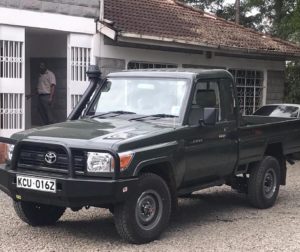 Speaking of keeping the ecosystem safe, our operational teams have received a huge boost from a long-time supporter Lori Price and the Elephant Crisis Fund (ECF), an initiative launched by Save the Elephants and the Wildlife Conservation Network, in partnership with the Leonardo DiCaprio Foundation. Their support has allowed MEP to increase patrol operations in the western portion of the ecosystem in the areas of Loita, Siyapei and Mosiro in the Rift Valley. This area continues to be a concern for elephant security and their presence will go a long way to improving security. MEP took delivery on the new ECF vehicle in May and it completed its retrofitting process and is expected in the Mara by the middle of July. Please note that despite Lori and ECF’s unwavering support, more funding is needed to create a permanent ranger unit in the Loita Hills area. Elephants play a key role in structuring habitats and no habitats are more important to Kenya’s well-being than its forests, which often act as the water tower for key rivers and lakes in Kenya. MEP’s ability to protect elephants in the Loita Forest will directly help protect the forest and the communities living alongside. A permanent ranger presence is needed to really make an impact in this area. MEP needs support for two years to establish a permanent ranger unit for the Loita Hills at an operational cost of $52,000 a year plus a further $71,000 for ranger field equipment and a vehicle resulting in an overall cost over the two years of $174,500.
Speaking of keeping the ecosystem safe, our operational teams have received a huge boost from a long-time supporter Lori Price and the Elephant Crisis Fund (ECF), an initiative launched by Save the Elephants and the Wildlife Conservation Network, in partnership with the Leonardo DiCaprio Foundation. Their support has allowed MEP to increase patrol operations in the western portion of the ecosystem in the areas of Loita, Siyapei and Mosiro in the Rift Valley. This area continues to be a concern for elephant security and their presence will go a long way to improving security. MEP took delivery on the new ECF vehicle in May and it completed its retrofitting process and is expected in the Mara by the middle of July. Please note that despite Lori and ECF’s unwavering support, more funding is needed to create a permanent ranger unit in the Loita Hills area. Elephants play a key role in structuring habitats and no habitats are more important to Kenya’s well-being than its forests, which often act as the water tower for key rivers and lakes in Kenya. MEP’s ability to protect elephants in the Loita Forest will directly help protect the forest and the communities living alongside. A permanent ranger presence is needed to really make an impact in this area. MEP needs support for two years to establish a permanent ranger unit for the Loita Hills at an operational cost of $52,000 a year plus a further $71,000 for ranger field equipment and a vehicle resulting in an overall cost over the two years of $174,500.
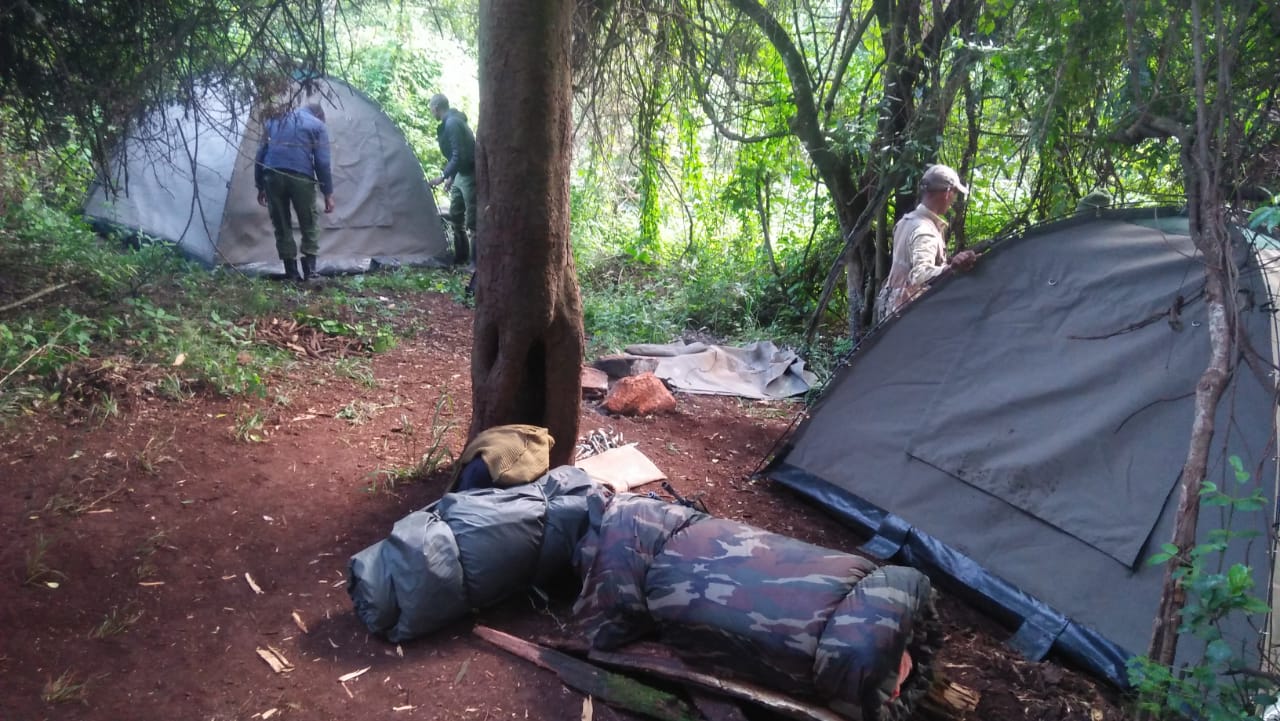
The MEP ranger camp in Loita in June.
Another big announcement for the second quarter is that in June we took delivery of the Karen Blixen Camp Trust (KBCT) helicopter, 5Y-MEP, and presented it to the patron of KBCT Mr. Karsten Ree. The machine arrived on the 27thof May and was quickly assembled by the Kenya Wildlife Service (KWS) Airwing but then took a while to be cleared for flight. We finally got all of the paperwork completed on the 25thof June. Since then we have used it to locate an injured elephant in the Mosiro area, complete patrol monitoring of MEP collared elephants and visit our ranger team in Loita. The re-deployment of the KBCT helicopter is an asset that keeps on giving and we will now be able get back on track with a number of our more logistically challenging missions like collaring in the forests. That being said, funds are needed to keep this vital tool flying. At an operational cost of $400 an hour, a critical need for MEP is supplementing a year’s worth of flying time for the MEP helicopter at $144,000. This would ensure we continue to operate the only helicopter dedicated to wildlife in the Mara.
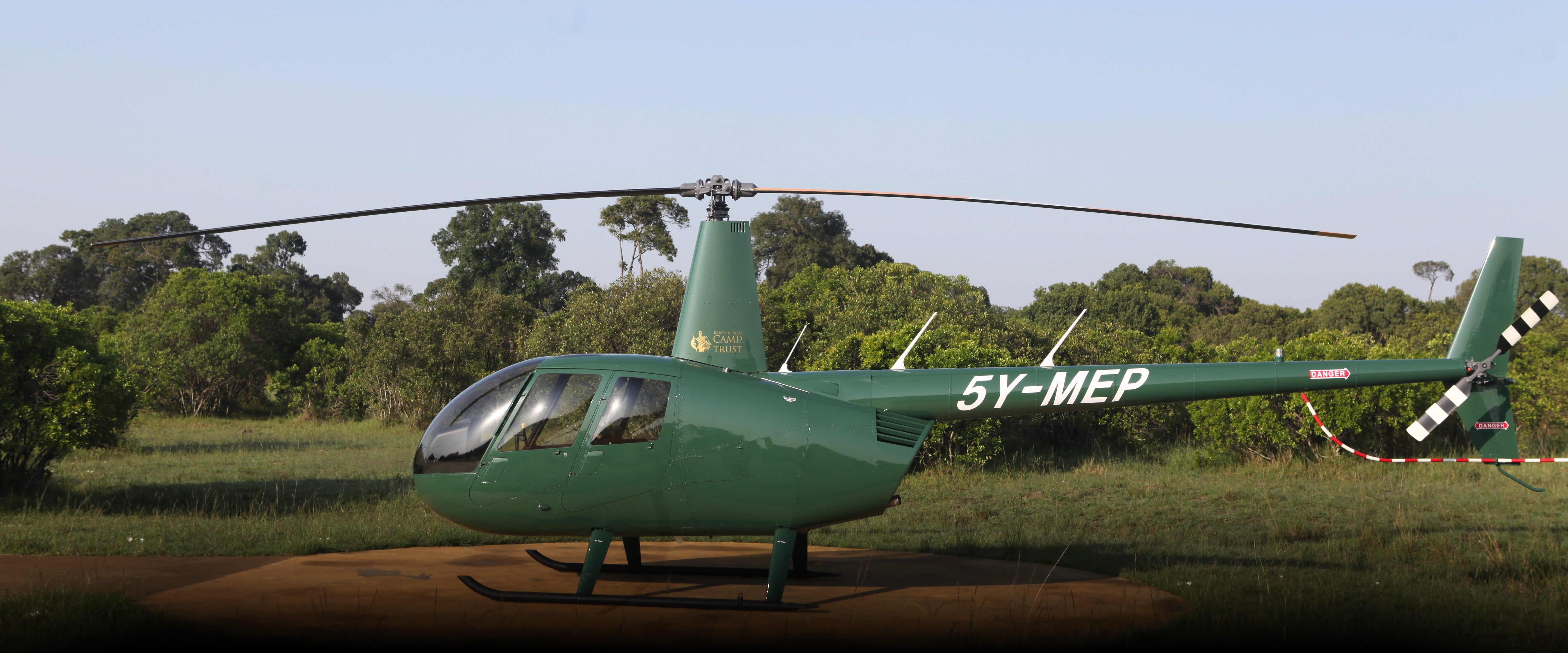 The KBCT 5Y-MEP helicopter at MEP HQ.
The KBCT 5Y-MEP helicopter at MEP HQ.
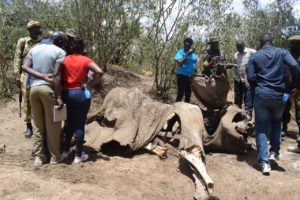
In April, MEP hosted a dedicated Monitoring of Illegally Killed Elephants (MIKE) training for all of the conservancies, Narok County Government, MEP and at MEP HQ in April. The MIKE program is a CITES program which strives to gather detailed data on elephant mortalities. Each quarter stakeholders collecting carcass data gather around the Mara to harmonize the data which means the data is reviewed together to ensure accuracy. The training is grouped into three two-day sessions that started on April 8 with the purpose to disseminate and promote MIKE ranger-based monitoring protocols and guidelines as a basis for strengthening MIKE site data collection and management. Participants were taken through MIKE reporting obligations to CITES that included MIKE data flow from ranger posts to MIKE CCU and ultimately to the production of updated MIKE analysis reports for CITES. Emphasis was put on reporting procedures and quality data collection. They were also trained on use of the GPS units for recording location data, cameras, establishing the cause of death, deducing the reason for death, elephant aging, carcass aging, sexing and recording evidence at the scene (pictured left). Overall, the MEP training had 45 participants and at the end of the three sessions 92 people were trained in MIKE data collection procedures and harmonization. Mara Elephant Project would like to thank Kenya Wildlife Service for partnering to make this training happen and Ol Kinyei Conservancy, Olare Motorogi Conservancy and Mara North Conservancy contributing financially toward this vital training.
MEP held its AGM and board meeting on May 23 and in this meeting, Kevin Rodrigues was introduced and voted in as the newest MEP Trustee. Kevin is an investment professional with over 13 years of experience in investment banking, merchant finance and private equity gained in the United States, Europe and Africa. Kevin currently works as a Director at LGT Lightstone, managing investment activities in Eastern & Lusophone Africa. Kevin holds an MBA from London Business School, UK and a B.A. (Economics) from Northwestern University, USA. MEP is delighted to have him as a new trustee. During the meeting the board approved the amended budget, the 2018 audited accounts, new policies to address potential risks identified in the annual audit and re-appointed PKF as the auditors for 2019. Updates were also given to the board on operations, research and MEP’s fundraising position.
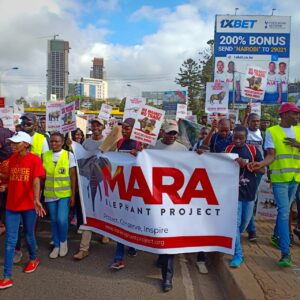 Finally, on April 13, over 4,000 people participated in the Global March for Elephants, Rhinos, Lions and Other Endangered Species in Nairobi, Kenya. Mara Elephant Project not only participated; we were one of the key sponsors for the event. MEP CEO Marc Goss along with MEP rangers Moses Lekekwar and John Sakaja, Tracking Manager Wilson Sairowua, Finance Officer Stanley Misoka and Trustee Moses Kamau marched to represent MEP. Locally, the march aimed to create awareness about the importance of protecting Kenya’s wildlife by encouraging the message: No Market. No Trade. This is all pointing to the key conservation decisions being made in August at the CITES meeting in Geneva. CITES is the global treaty that regulates wildlife trade and many of the key decisions that directly affect the elephant population are made at the World Wildlife Conference. Legal markets for ivory undermine MEP’s efforts of protecting elephants and with that in mind, MEP along with other conservation organizations, government and concerned citizens in Kenya call for the closing of all legal ivory markets around the world. MEP was proud to participate in the Global March alongside our partners Kenya Wildlife Service, Wildlife Direct and other conservation organizations. The crowd was energized and came up with many chants and slogans and the colorful 4,000 plus people definitely turned heads across the city center as the march proceeded the 10 km from the National Museums of Kenya to the KWS HQ. It was an amazing experience for MEP!
Finally, on April 13, over 4,000 people participated in the Global March for Elephants, Rhinos, Lions and Other Endangered Species in Nairobi, Kenya. Mara Elephant Project not only participated; we were one of the key sponsors for the event. MEP CEO Marc Goss along with MEP rangers Moses Lekekwar and John Sakaja, Tracking Manager Wilson Sairowua, Finance Officer Stanley Misoka and Trustee Moses Kamau marched to represent MEP. Locally, the march aimed to create awareness about the importance of protecting Kenya’s wildlife by encouraging the message: No Market. No Trade. This is all pointing to the key conservation decisions being made in August at the CITES meeting in Geneva. CITES is the global treaty that regulates wildlife trade and many of the key decisions that directly affect the elephant population are made at the World Wildlife Conference. Legal markets for ivory undermine MEP’s efforts of protecting elephants and with that in mind, MEP along with other conservation organizations, government and concerned citizens in Kenya call for the closing of all legal ivory markets around the world. MEP was proud to participate in the Global March alongside our partners Kenya Wildlife Service, Wildlife Direct and other conservation organizations. The crowd was energized and came up with many chants and slogans and the colorful 4,000 plus people definitely turned heads across the city center as the march proceeded the 10 km from the National Museums of Kenya to the KWS HQ. It was an amazing experience for MEP!
Continued support is critical to our organization fulfilling our mission, please donate today.


